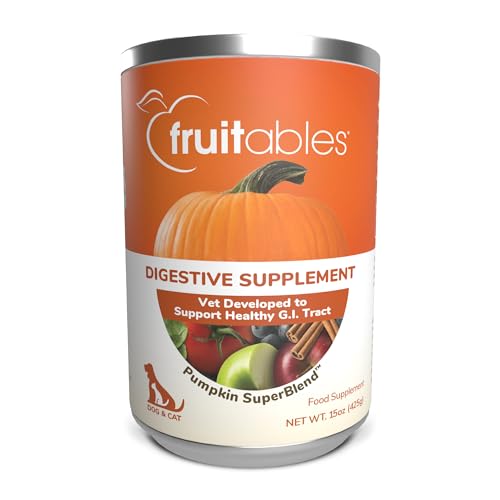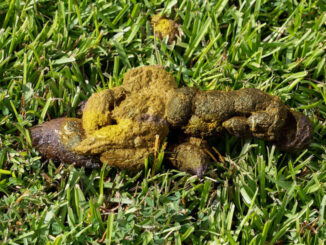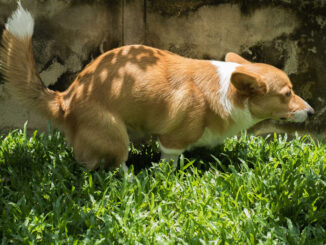
This article was updated on January 5th, 2023
Constipation can be a lingering and frequent problem for dogs, with one of the main issues being that most pet parents don’t completely understand it. There are several strategies to consider when your dog is constipated, and those will determine the best course of action for getting your furry pal some relief.
How to Tell if Your Dog is Constipated
Knowing if a dog is constipated may actually be harder than you think. For instance, many dog parents don’t pay strict attention when their dog heads outside to do their business and don’t actually witness their dog going, or not going, poop. Also, constipation refers to going poop less often than normal or having difficulty doing so.
You will know that your dog is constipated if your dog is:
- straining to poop,
- passing hard, dry feces
- not going with their regular normalcy or not pooping for 48 hours
- hunched in the back due to discomfort
- passing a little blood with their feces.
6 Easy and Effective Home Remedies to Help a Constipated Dog Poop Quickly
Mild cases of constipation in dogs can often be treated at home. If this is your first time dealing with it, be sure to contact your veterinarian and follow their recommendations. If your dog isn’t showing any other signs, such as fever, vomiting, severe abdominal pain, or a decreased appetite, try these:
1. Take your dog for a walk for 15 minutes
Exercise stimulates intestinal movement to help get things out. You can even give them a bite to eat and take them out for 15-20 minutes to try to get things right again.
2. Increase your dog’s water intake.
Encourage your dog to drink more water with the following strategies:
- Offer clean and cool water at all times.
- Feed your dog ice cubes as a treat.
- Give your dog chicken or beef broth: it will help increase your dog’s water intake and help move more fluid into your dog’s colon thus making them poop quicker (learn more about broths for dogs, or check out the Amazon listing below).
3. Add canned pumpkin to your dog’s meal (1-to-4 tablespoons of pumpkin)
Canned pumpkin is a great source of fiber and most dogs really like it. Offer them a couple of tablespoons or more depending on their size. This means plain pumpkin, not pumpkin pie filling. We simply recommend canned pumpkin:
You can also use pumpkin treats or bites, including the following products listed on Amazon:
Important: Always consult a vet before changing your dog’s diet, especially if they have an underlying illness, such as diabetes or kidney disease.
4. Switch to canned food
Canned dog food has more moisture than kibble. Feeding canned dog food will help promote more moisture in your dog’s stool, making it easier for them to poop.
5. Feed your dog fiber-rich food
Any way you can increase your dog’s fiber intake has the possibility of helping relieve constipation. Speak to your veterinarian before giving your dog any human fiber supplements to ensure that it is safe and you have the proper dose. Another great source of fiber is bran cereal although your dog might not be as willing to gobble it up. Check out these 2 popular products:
6. Use over-the-counter medications
Over-the-counter medications like Miralax can help stimulate your dog to poop more. These medications are designed to bring water into your dog’s colon and make it easier for them to poop. The dosage of Miralax is a 1 tsp for a small dog ½ Tbsp for a medium sized dog and 1Tbsp for a large dog twice a day – but be sure to check-in with your vet before you give your dog any new medication (even over-the-counter medications).
- UNBLOCK YOUR SYSTEM: An osmotic laxative, MiraLAX works naturally with the water in your body to hydrate, soften, and ease stool through your colon in 1-3 days, whereas stimulant laxatives stimulate the nerves to move stool through the colon immediately
You can also learn more easy tips from our vet & dog training team by reading our article: 18 Tips To Help Dogs Poop Quickly [From a Vet & Dog Trainer], or keep reading this article for more important tips to help constipated dogs.
When is Your Dog’s Constipation a Cause for Concern?
How often a dog should poop is going to vary with every dog. Generally speaking, a dog will poop at least once a day but can be upwards of four or five if they are fed frequent meals. Knowing what is normal for your dog is the first step is being able to recognize when there is a problem. If your dog is normally a three times a day goer, only going once may be considered constipation.
Since dogs poop at least once per day, some go even more, not pooping for 48 to 72 hours (2-3 days) is a cause for concern.
This is especially true if they have a normal appetite and are drinking water. If they haven’t passed any feces in 48 hours, they are considered constipated. Learn more with our article How Long Can a Dog Go Without Pooping. Let’s now review easy and effective home remedies that can help your dog.
When to Take a Constipated Dog to the Veterinarian
Most cases of constipation are fairly mild and often respond to at-home treatments, but there are times when they don’t. If your dog still hasn’t pooped after 48-72 hours and trying some of the above treatments, it’s time to see your vet. Also, if your dog is particularly uncomfortable or in pain, or if they are showing any other signs, see your vet.
Maybe it’s your first time dealing with constipation in dogs and you just don’t feel comfortable going at it alone; your vet will be more than happy to assist you. Your vet can also help you figure out repeat or chronic cases of constipation.
Veterinary Treatments for Constipation in Dogs
Your veterinarian will have a slightly different approach to constipation in dogs. The main goal is to get rid of any retained feces in the colon. This can be done by an enema, manual removal, or medications that increase the fluid in the feces. Enemas and manual removal can be painful, so you shouldn’t try it at home.
Dogs with severe constipation may also need fluids to rehydrate or even surgery to remove an intestinal obstruction. Dogs that have a long history of constipation may require a dietary change or life-long medications to prevent further issues.
The cost for seeing the vet for a constipated dog is going to vary based on the severity and cause. A simple case of constipation requiring an enema may run you $100-$200, while a surgery to remove a foreign body from the intestine will be more around $1,500-$3,000.
Why is Your Dog Constipated?

There’s not one cause of constipation in dogs. In fact, the list of possible causes can be quite long.
When a dog becomes constipated, it may be due to an impairment in the muscular contractions to move the waste through or because the waste products get stuck. With this in mind, constipation may be caused by:
- Dehydration
- Lack of exercise
- Lack of fiber in diet
- Non-digestible blockages
- Self-grooming that leads to excess hair in the feces
- Tumors in the rectum
- Anal gland issues, including impaction and infection
- An enlarged prostate in intact males
- Injury to the back or pelvis
- Stress or anxiety
- Certain medications and medical conditions such as kidney disease and hypothyroidism
Constipation may be more common in older dogs because their digestive system isn’t as efficient or they may have kidney disease, prostate problems or other health issues that may lead to constipation.
Frequently Asked Questions About Constipated Dogs
Can you give a dog too much pumpkin or olive oil?
Giving your dog too much pumpkin can actually take the place of their regular dog food causing nutrient deficiencies. Stick with small amounts daily or larger amounts temporarily to help relieve constipation. Giving a lot of olive oil can lead to diarrhea or even pancreatitis.
My dog is constipated and vomiting, what should I do?
Anytime your dog is showing any other signs along with their constipation, it’s time to see a vet. Vomiting along with constipation may be indicative of a more serious issue, like an intestinal obstruction, that will need to be treated professionally.
My dog is constipated but is eating plants. Is this normal? What should I do?
Dogs eat plants for a number of reasons, one of which is trying to relieve digestive discomfort. If your dog is eating plants and constipated, you should try some at-home constipation remedies or see your veterinarian.
How Can You Prevent Your Dog From Getting Constipated in the Future
Whether your dog is no stranger to constipation or you’d just rather not experience it in the first place, there are a few steps you can take to help prevent future mishaps.
The first step is to make sure your dog stays hydrated. This can be tough in older dogs since they may not drink as much water or have other issues like kidney disease. Just make sure they always have water available to them and encourage them by adding a little flavor from low sodium chicken broth or sugar-free electrolytes.
Get them moving everyday. Short walks two or three times a day will help encourage intestinal movement as well as keep their joints and muscles healthy and strong. It doesn’t take a lot, just make sure they get some movement daily.
Up their fiber intake with supplements like pumpkin or a high fiber diet. Some dogs may even do well with a low residue diet that is easily digestible with little left over to block up their system. Your veterinarin will be able to recommend what diet is best for your dog depending on the cause of their constipation.
Keep them from eating things they shouldn’t through behavioral training or other methods recommended by your veterinarian.
Read More About Dog Pooping Issues:










Disclaimer: This website's content is not a substitute for veterinary care. Always consult with your veterinarian for healthcare decisions. Read More.














Be the first to comment